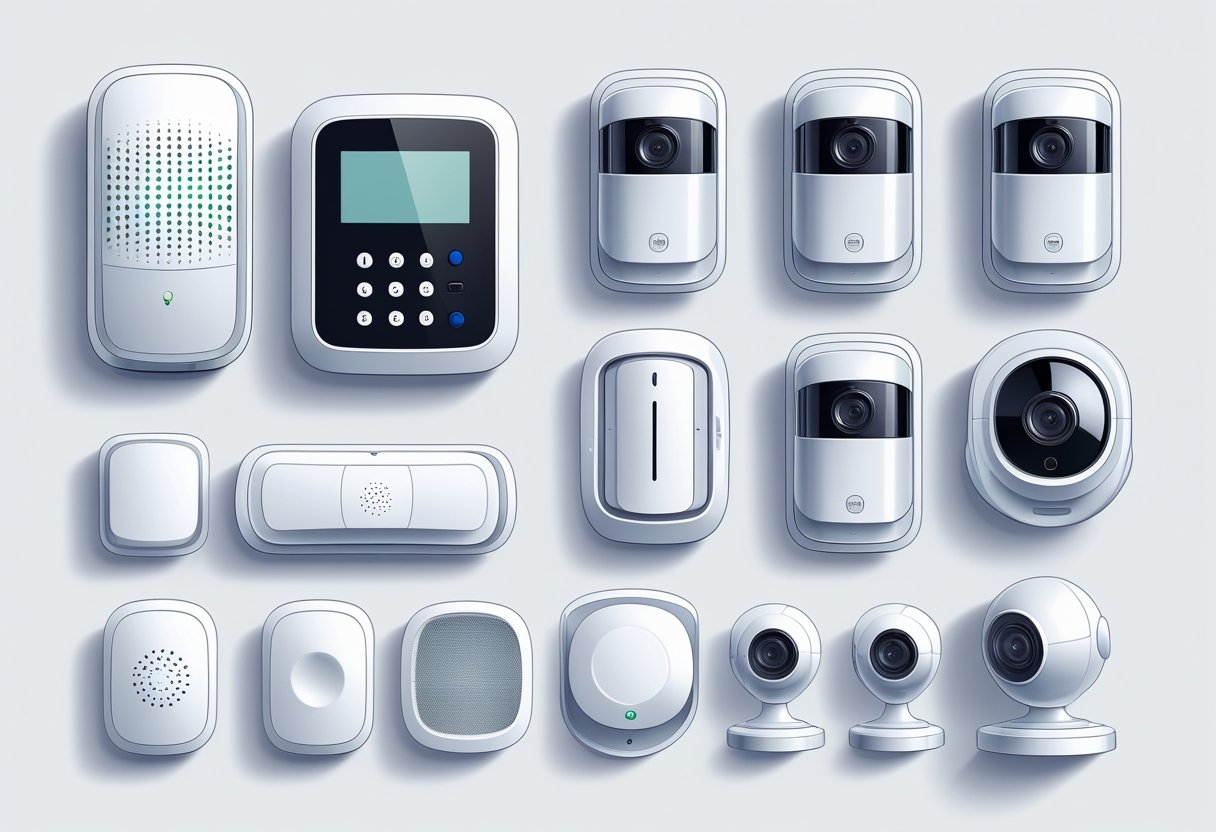Home security is a vital concern for homeowners, especially in the greater Houston area where crime rates can vary significantly. Understanding the various components of an alarm system can greatly enhance your safety and peace of mind. Each part of your home security alarm system plays a critical role in ensuring comprehensive protection against intruders and emergencies.
When you consider upgrading or building your security system, it’s essential to familiarize yourself with key components such as sensors, keypads, and cameras. These elements not only work together to provide a cohesive defense strategy but also allow for customization based on your specific needs. Knowing what to look for can make a substantial difference in how well your system functions.
Investing in quality alarm system parts provides you with the reliability and efficiency necessary for effective home protection. From magnetic contacts to advanced motion detectors, having the right components ensures that you are well-equipped to safeguard your home and loved ones. Understanding these parts can empower you to make informed decisions about enhancing your home security setup.
Essential Home Security Alarm Parts
Understanding the critical components of a home security alarm system is vital for effective protection. Each part plays a specific role in safeguarding your property and ensuring peace of mind.
Control Panels
The control panel is the brain of your security system. It connects all components and allows you to manage them easily. When an alarm is triggered, the control panel processes the signals from various sensors.
You can control your alarm system using a central unit located in a secure area of your home. Look for features such as remote access and smartphone connectivity, which enable you to monitor activities while you're away.
Having a reliable control panel ensures that all systems operate seamlessly.
Sensors and Detectors
Sensors and detectors are crucial for identifying unauthorized entry or potential hazards. Common types include door and window sensors, motion detectors, and glass break sensors. These devices can detect movement or the opening of doors and windows.
For maximum security, consider integrating environmental sensors that detect smoke or carbon monoxide. This can alert you to dangers beyond intrusions.
Utilizing a combination of these sensors will create a comprehensive security defense.
Keypads
Keypads are essential for arming and disarming your alarm system. They typically feature a numeric keypad for entering security codes. Look for models with backlit screens for easy visibility in low-light conditions.
Many modern keypads offer advanced features such as biometric recognition or proximity sensors. A user-friendly interface is crucial for quick access during emergencies.
Strategically place your keypad near main entrances for convenience and security.
Siren and Alert Devices
Siren and alert devices serve as the audible deterrent in any security system. When an alarm is triggered, these devices emit loud sounds to alert you and scare off intruders.
Choose from a range of sirens, including indoor and outdoor versions. Some systems also allow notifications to be sent straight to your smartphone or monitoring service.
Incorporating visible alarm devices will also warn potential burglars that your home is secured.
Types of Sensors and Detectors for Alarm Systems
Understanding the various sensors and detectors in your alarm system is essential for effective home security. Each type plays a crucial role in protecting your property from different threats, ensuring comprehensive coverage and peace of mind.
Door and Window Contacts
Door and window contacts are fundamental components of any home security system. These sensors typically consist of two parts: a magnet and a switch. When a door or window is closed, the magnet keeps the circuit closed, and the alarm remains off.
When the door or window opens, the magnet moves away from the switch, triggering the alarm. This immediate notification can deter intruders before they enter your home. Installing these sensors on all entry points enhances security, ensuring that every vulnerable area is monitored.
Many systems allow you to customize these sensors with features such as alerts sent directly to your smartphone, keeping you informed in real time.
Motion Detectors
Motion detectors are designed to alert you when movement is detected within a specific area. These devices use technologies such as passive infrared (PIR) or microwave detection to sense changes in heat or movement.
PIR detectors are highly effective in residential settings as they detect body heat, minimizing false alarms caused by pets or small objects. You can position these detectors in hallways, living rooms, or other high-traffic areas to enhance your home’s security.
Most modern alarm systems offer adjustable sensitivity settings, allowing you to tailor the detection area and reduce the chance of false triggers while maintaining optimal security.
Glass Break Detectors
Glass break detectors are specialized sensors that listen for the sound frequency of breaking glass. They are essential additions to your security system, particularly if you have large windows or sliding glass doors.
These detectors can be installed in common areas or near vulnerable glass features. They provide an additional layer of protection, ensuring that even if an intruder bypasses other sensors, any attempt to break or shatter glass will set off the alarm.
For best results, combine glass break detectors with door and window contacts for comprehensive coverage. Many devices also offer remote monitoring capabilities, allowing you to stay connected to your home’s security status.
Smoke and Fire Detectors
Smoke and fire detectors are critical not only for property security but also for personal safety. These detectors can sense the presence of smoke or heat, providing early warnings in the event of a fire.
In a home security system, these detectors can be integrated to trigger alarms when smoke is detected. This feature is crucial, as it allows you to react quickly, potentially saving lives and property.
Modern devices often feature smart technology, enabling them to send alerts directly to your phone when smoke is detected, even when you're not home. Regular maintenance and testing ensure these detectors function properly, providing peace of mind for you and your family.
Wired vs. Wireless Alarm System Components
Understanding the components of wired and wireless alarm systems can help you choose the best option for your security needs. Each system offers unique components and integration capabilities, directly affecting installation and functionality.
Hardwired Parts and Compatibility
Hardwired security systems employ physical wiring to connect various components, including sensors, cameras, and control panels. These connections usually run through walls and ceilings, providing a stable and reliable communication path.
Typical hardwired components include:
- Control Panels: Centralized units that communicate with all system parts.
- Sensors: Motion detectors, door/window sensors, and glass break detectors.
- Cameras: Often integrated with the system for live surveillance.
Compatibility is generally strong among hardwired components. Upgrading or replacing parts usually involves minimal headache, as they adhere to standard wiring practices. This makes repairs easier and more cost-effective for homeowners in the Houston area.
Wireless Devices and Panels
Wireless alarm systems utilize radio signals to communicate between devices and the control panel. This setup offers flexibility during installation and allows for easier expansion. You can add or relocate sensors without extensive rewiring.
Key components of a wireless system include:
- Wireless Sensors: Battery-operated motion detectors and door/window contacts.
- Control Panels: Central units that receive signals from devices within the system.
- Cameras: Wireless cameras that transmit data over Wi-Fi.
However, you must ensure battery maintenance and address potential signal interference. Wireless systems can be ideal for homes where cabling installation is impractical or disruptive.
Hybrid Security Systems
Hybrid systems integrate both wired and wireless technologies, allowing you to capitalize on the advantages of each. You can use existing wired components while supplementing them with wireless devices.
Common features include:
- Flexibility: Ability to add wireless cameras or sensors to an existing wired setup.
- Compatibility: Most wired systems seamlessly accommodate select wireless components.
Hybrid systems offer a balanced solution for those who want stability with the option to expand their home security. This can be particularly advantageous for residents in the Houston area who may find themselves wanting to upgrade their system as technology evolves.
Replacement and Upgrade Options for Alarm Parts
When considering replacement and upgrade options for alarm parts, it’s essential to evaluate compatibility, functionality, and sources for your replacements. Knowing whether to choose generic parts or specific brands can greatly affect your home security system's efficiency. Additionally, finding the right replacement parts and considering an upgrade can enhance your system's performance.
Generic Versus Brand-Specific Parts
Generic alarm parts may offer significant savings compared to brand-specific options. However, while they can be compatible, you must ensure they meet safety and performance standards. Brand-specific parts, on the other hand, are designed to work seamlessly with your alarm system, often providing more reliable functionality.
When considering a replacement, check specifications carefully. For example:
- Compatibility: Ensure the part fits your existing system model.
- Warranty: Brand-specific parts often have warranties covering defects.
- Performance: Generic parts may not perform as consistently as branded ones.
Assessing your budget against your security needs will guide you in making the right choice.
Finding Replacement Parts
Locating replacement parts for your alarm system in the greater Houston area can be straightforward if you know where to look. Trusted suppliers, local electronics stores, and specialized security retailers offer both generic and brand-specific options.
To aid in your search, consider:
- Online Retailers: Ecommerce site or specialized security sites have a range of alarm system parts.
- Local Suppliers: Check with local stores that focus on home security; they can provide valuable recommendations.
- Manufacturer Websites: If you need brand-specific parts, start with the manufacturer's website for direct replacements.
It's essential to verify that any replacement part matches your system's specifications to maintain proper functionality.
Upgrading Existing Systems
Upgrading your existing alarm system can enhance its capabilities and improve security measures. Look into features such as smart technology integration, which allows remote access through your smartphone.
Consider the following options when upgrading:
- Wireless Components: Switch to wireless sensors to streamline installation and reduce wiring issues.
- Smart Technology: Add smart home features like automation for lights and locks.
- Improved Sensors: Upgrade to advanced motion detectors or cameras that offer higher resolution and better detection rates.
By exploring these upgrades, you can significantly boost your home security system's effectiveness, ensuring better protection for your property.
Installation and Maintenance Considerations
When setting up your home security alarm system, careful attention to installation and maintenance is crucial. These factors will ensure that your system operates effectively and serves its purpose of protecting your home.
DIY Versus Professional Installation
Choosing between DIY installation and hiring professionals depends on your technical skills and comfort level.
DIY Installation: If you're handy and have a good understanding of technology, you can potentially save money by installing the system yourself. You will need tools and a well-detailed instruction manual.
Professional Installation: On the other hand, enlisting professionals guarantees that everything is set up correctly. They can assess your property for optimal sensor placement and wiring. Many local companies in the Greater Houston area specialize in these services, ensuring compliance with local codes.
Routine Maintenance Tips
Regular maintenance of your home security system is essential for optimal performance. Here are key practices to follow:
- Check Sensors and Cameras: Regularly inspect all sensors and cameras for functionality. Confirm that they are properly aligned and unobstructed.
- Battery Replacement: Ensure that batteries in wireless components are replaced as needed, usually every 6-12 months.
- Software Updates: Keep your system’s software updated to protect against vulnerabilities, especially for smart home integrations.
- System Testing: Schedule bi-annual tests of your security system to confirm all components work effectively.
Troubleshooting Common Issues
Even well-maintained security systems can encounter problems. Knowing how to troubleshoot is vital:
- False Alarms: If you experience frequent false alarms, check for obstructions and ensure your sensors are not overly sensitive.
- Power Issues: If the system is not powering up, verify that all connections are secure and check circuit breakers.
- Connectivity Problems: For smart systems, ensure that your Wi-Fi connection is stable. Weak signals can cause malfunctions in monitoring features.
- Inconsistent Alerts: If alerts are delayed, examine your network settings and make sure your security provider’s app is updated.
Addressing these issues promptly will help maintain the efficacy of your home security system in protecting your home.
Frequently Asked Questions
When selecting a home security alarm system, it is essential to understand the various components and considerations involved. This section addresses common inquiries regarding alarm systems to help you make informed decisions.
What are the essential components of a hard-wired home alarm system?
A hard-wired home alarm system typically consists of four essential components: the control panel, sensors, keypads, and alarm sounders. The control panel serves as the system's command center, connecting all components. Sensors detect unauthorized entry, while keypads allow you to arm or disarm the system. Alarm sounders alert you to threats.
Where can I find a store that sells home alarm system parts?
In the greater Houston area, you can find several stores that specialize in home alarm system parts. Retailers like security supply stores and electronics shops often carry a range of components. Additionally, online platforms provide delivery options for parts, allowing you to obtain what you need conveniently.
What should I consider when looking for wholesale security equipment suppliers?
When searching for wholesale security equipment suppliers, consider their reputation, product range, and pricing. Look for suppliers that offer high-quality brands and have positive customer reviews. It's also beneficial to evaluate their customer service and support, ensuring they can assist you with any issues that may arise.
What are the differences between a commercial and a residential alarm system?
Commercial alarm systems are typically more robust and designed to cover larger areas with more advanced technology. These systems often include features like access control and video surveillance. Residential systems are generally simpler, focusing primarily on intrusion detection and basic monitoring for homes.
How do I choose the best DIY home security system with no monthly fees?
To select the best DIY home security system without monthly fees, prioritize ease of installation and user-friendly features. Look for systems that allow self-monitoring through smartphone apps and include essential components such as cameras and sensors. Checking compatibility with smart home devices can enhance your security experience.
What factors should I consider when purchasing an alarm system for my home?
When purchasing an alarm system, consider factors such as your home's size, the number of entry points, and any specific security needs. Assess different system features, including motion detection, camera quality, and remote access capabilities. Budget is also important; weigh the upfront costs against potential monthly fees if applicable.
.svg)



.svg)


.svg)



